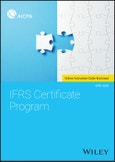The IFRS (International Financial Reporting Standards) Certificate program (40.5 CPE Credits) will distinguish you from other accounting and finance professionals and expand your career opportunities both in the U.S. and globally.
Since more than 125 countries require or permit the use of IFRS, taking this program will give you a distinct competitive advantage over your peers. As of January 1, 2018, those who successfully complete all courses in the curriculum will receive a certificate of achievement, a digital badge, a subscription to the eIFRS online subscription service and 40+ hours of CPE credit.
Why is IFRS relevant in the US, and for you?
- U.S. multinationals are headquartered across the U.S., so you could easily find yourself with a client that has IFRS requirements, either for itself or a non-U.S. subsidiary.
- You might increasingly find yourself structuring deals and transactions with IFRS counterparties, including vendors and customers. Understanding the implications of structuring these transactions and reporting using IFRS will require you to have more than a passing knowledge of the differences between IFRS and U.S. GAAP.
- As both the FASB and IASB continue their standard-setting agendas, you'll need to assess proposals and be concerned about divergence that could impact your financial reporting or audit responsibilities going forward.
Courses included:
Credit for individual courses purchased can be applied to the full program if purchased within one year.
- IFRS: Business Combinations (IFRS 3)
- IFRS: Separate and Consolidated Financial Statements (IFRS 10 & IAS 27)
- IFRS: Earnings Per Share (IAS 33)
- IFRS: Fair Value Measurement (IFRS 13)
- IFRS: Financial Statements, Interim Reporting, and Cash Flows (IAS 1, IAS 34, and IAS 7)
- IFRS: Financial System Considerations in IFRS
- IFRS: The Effects of Changes in Foreign Exchange Rates
- IFRS: Impairment of Non-Financial Assets (IAS 36)
- IFRS: Income Taxes (IAS 12)
- IFRS: Intangible Assets (IAS 38)
- IFRS: Inventories (IAS 2)
- IFRS: Investment Property (IAS 40)
- IFRS: Investments in Associates and Joint Arrangements (IAS 28 and IFRS 11)
- IFRS: Financial Instruments (IFRS 9, IAS 39, IAS 31, and IFRS 7)
- IFRS: Leases (IAS 17)
- IFRS: Liabilities, Provisions and Contingencies (IAS 37)
- IFRS 5: Non-current Assets Held for Sale and Discontinued Operations
- IFRS: Policies, Changes, Errors; Events After Reporting Date; Related Parties (IAS 8, 10, and 24)
- IFRS: Property, Plant & Equipment (IAS 16)
- IFRS: Revenue Recognition (IAS 18 and IAS 11)
- IFRS: Segment Reporting (IFRS 8)
- IFRS: Share-based Payments and Employee Benefits, non-pension (IFRS 2 and IAS 19)
- IFRS: Tax Considerations Beyond IAS 12
- IFRS Governance and Conceptual Framework
- IFRS: The Starting Point (IFRS 1)
Who Will Benefit?
- Accounting and finance professionals who work for private or public multinational organizations whose parent entity or subsidiaries have adopted IFRS
- Accountants in public practice who provide audit or assurance services to private or public multinational organizations that have adopted IFRS
Learning Objectives
- Acquire a broad overview of key IFRS definitions and concepts.
- Obtain proficiency in complex IFRS areas including financial instruments and business combinations.
- Apply the fundamental principles of IFRS across a range of accounting topics.
- Understand the accounting impact of the latest standards and amendments issued by the IASB.
Key Topics
- Fair value measurement
- Intangible assets
- Financial instruments
- Leases
- Revenue recognition
- Governance and conceptual framework
Credit Info
- CPE CREDITS: Online: 40. Once activated, you will gain immediate online access to the product.
System Requirements
AICPA’s online CPE courses will operate in a variety of configurations, but only the configuration described below is supported by AICPA technicians.
A stable and continuous internet connection is required. In order to record your completion of the online learning courses, please ensure you are connected to the internet at all times while taking the course. It is your responsibility to validate that CPE certificate(s) are available within your account after successfully completing the course and/or exam.
Supported Operating Systems:
- Macintosh OS X 10.








